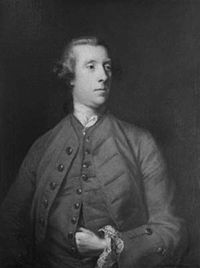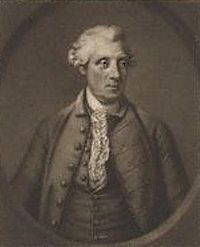
Simon Harcourt, 1st Earl Harcourt
Encyclopedia


Stanton Harcourt
Stanton Harcourt is a village and civil parish in Oxfordshire about southeast of Witney and west of Oxford.-Archaeology:Within the parish of Stanton Harcourt is a series of paleochannel deposits buried beneath the second gravel terrace of the river Thames...
, Oxfordshire
Oxfordshire
Oxfordshire is a county in the South East region of England, bordering on Warwickshire and Northamptonshire , Buckinghamshire , Berkshire , Wiltshire and Gloucestershire ....
, PC, FRS, Viceroy of Ireland (1714 – 16 September 1777), known as 2nd Viscount Harcourt, of Stanton Harcourt, Oxfordshire, between 1727 and 1749, was a British diplomat and general.
Life and work
Simon Harcourt, 1st Earl Harcourt, was educated at Westminster SchoolWestminster School
The Royal College of St. Peter in Westminster, almost always known as Westminster School, is one of Britain's leading independent schools, with the highest Oxford and Cambridge acceptance rate of any secondary school or college in Britain...
. He succeeded his grandfather Simon Harcourt, 1st Viscount Harcourt
Simon Harcourt, 1st Viscount Harcourt
Simon Harcourt, 1st Viscount Harcourt, of Stanton Harcourt, Oxfordshire, PC was Queen Anne's Lord Chancellor of Great Britain. He was her solicitor-general and her commissioner for arranging the union with Scotland...
in 1727. In 1745, having raised a regiment for service during the Jacobite Rebellion, the 76th Foot (Lord Harcourts Regiment)
76th Regiment of Foot
The 76th Regiment of Foot was originally raised as Lord Harcourt's Regiment on 17 November 1745 and disbanded in June 1746. Following the loss of Minorca to the French, it was raised again in November 1756 as the 61st Regiment, but renumbered to 76th, by General Order in 1758, and again disbanded...
, he received a commission as a Colonel in the army, The regiment was disbanded on 10 June 1746.
In 1749 he was created Earl Harcourt of Stanton Harcourt. He was appointed governor to the prince of Wales, afterwards George III, in 1751; and after the accession of the latter to the throne, in 1761, he was appointed as special ambassador to Mecklenburg-Strelitz
Mecklenburg-Strelitz
Mecklenburg-Strelitz was a duchy and later grand duchy in northern Germany, consisting of the eastern fifth of the historic Mecklenburg region, roughly corresponding with the present-day Mecklenburg-Strelitz district , and the western exclave of the former Bishopric of Ratzeburg in modern...
, to negotiate a marriage between King George and Charlotte of Mecklenburg-Strelitz
Charlotte of Mecklenburg-Strelitz
Charlotte of Mecklenburg-Strelitz was the Queen consort of the United Kingdom as the wife of King George III...
(Princess Charlotte), whom he conducted to England.
He held a number of appointments at court and in the diplomatic service. He was the British ambassador to Paris from 1768 to 1772. He was promoted to the rank of general in 1772; and in October of the same year he succeeded Lord Townshend
George Townshend, 1st Marquess Townshend
Field Marshal George Townshend, 1st Marquess Townshend, PC , known as The Viscount Townshend from 1764 to 1787, was a British soldier who reached the rank of field marshal.-Early life:...
as Lord Lieutenant of Ireland
Lord Lieutenant of Ireland
The Lord Lieutenant of Ireland was the British King's representative and head of the Irish executive during the Lordship of Ireland , the Kingdom of Ireland and the United Kingdom of Great Britain and Ireland...
, an office which he held until 1777. His proposal to impose a tax of 10% on the rents of absentee landlord
Absentee landlord
Absentee landlord is an economic term for a person who owns and rents out a profit-earning property, but does not live within the property's local economic region. This practice is problematic for that region because absentee landlords drain local wealth into their home country, particularly that...
s had to be abandoned owing to opposition in England; but he succeeded in conciliating the leaders of Opposition in Ireland, and he persuaded Henry Flood
Henry Flood
Henry Flood , Irish statesman, son of Warden Flood, Lord Chief Justice of the King's Bench for Ireland, was educated at Trinity College, Dublin, and afterwards at Christ Church, Oxford, where he became proficient in the classics...
to accept office in the government.
Resigning in January 1777, he retired to Nuneham Park
Nuneham House
Nuneham House is a Palladian villa, at Nuneham Courtenay in Oxfordshire England. It was built for Simon Harcourt, 1st Earl Harcourt in 1756. It is owned by Oxford University and is currently used as a retreat centre by the Brahma Kumaris World Spiritual University...
, where he died on 16 September, apparently by drowning
Drowning
Drowning is death from asphyxia due to suffocation caused by water entering the lungs and preventing the absorption of oxygen leading to cerebral hypoxia....
in a well while trying to rescue his dog. He married, on 16 October 1735, Rebecca Samborne Le Bas (died 16 January 1765), daughter and heiress of Charles Samborne Le Bas, of Pipewell Abbey, Northamptonshire
Northamptonshire
Northamptonshire is a landlocked county in the English East Midlands, with a population of 629,676 as at the 2001 census. It has boundaries with the ceremonial counties of Warwickshire to the west, Leicestershire and Rutland to the north, Cambridgeshire to the east, Bedfordshire to the south-east,...
, by whom he had two daughters, Lady Elizabeth (18 June 1739 - 21 January 1811, buried at Hartwell
Hartwell
Hartwell is a village in central Buckinghamshire, England. It is to the south of Aylesbury, by the village of Stone.The village name is Anglo Saxon in origin, and means "spring frequented by deer". In the Domesday Book of 1086 it was recorded as Herdeuuelle and Herdewelle.The ruined Hartwell...
), married on 20 June 1763 Sir William Lee, 4th Baronet, of Hartwell (12 September 1726 - 6 July 1799) and Lady Anne (1741–1746), and two sons, George Simon and William
William Harcourt, 3rd Earl Harcourt
Field Marshal William Harcourt, 3rd Earl Harcourt, of Stanton Harcourt, Oxfordshire, GCB was a British nobleman and soldier. He was the younger son of Simon Harcourt, 1st Earl Harcourt.-Seven Years War:...
, who succeeded him as 2nd and 3rd earl respectively.

